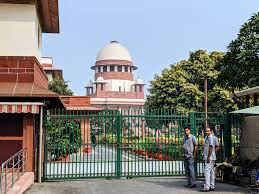Acting on a Public Interest Litigation, a Division Bench of the High Court of Judicature at Calcutta by its order dated 27 April 2023 held that the allegations implicate offences punishable under the Explosive Substances Act. Hence, the High Court held that this is a fit case where the entire investigation should be transferred to the National Investigation Agency with a direction to the Central Government to exercise their power under Section 6(5) of the National Investigating Agency Act 2008. (Para 2)
Section 6(1) of the NIA Act requires an officer in-charge of a police station to forward a report to the State Government forthwith on the receipt of information and the recording thereof under Section 154 of the Code of Criminal Procedure, “relating to any scheduled offence”. The expression “relating to any scheduled offence” is an expression of a broad amplitude. Sub-section (2) of Section 6 mandates that on receipt of a report under Section 6(1), the State Government shall forward the report to the Central Government “as expeditiously as possible”. Thereafter, in terms of sub-section (3), the Central Government has to determine within a stipulated period on the basis of the information made available by the State Government “or received from other sources”, whether the offence is a scheduled offence or not and whether having regard to the gravity of the offence and other relevant factors, it is a fit case to be investigated by the agency. Upon forming such an opinion, the Central Government is empowered under sub-section (4) to direct the NIA to investigate the offence. (Para 7)
Sub-section (1) of Section 6 casts an affirmative obligation initially on the officer in-charge of a police station to report to the State Government, on receipt of information under Section 154 relating to any scheduled offence. Section 6(2) casts a duty upon the State Government to forward the report to the Central Government expeditiously. As regards the role of the Central Government, sub-section (3) makes it abundantly clear that the formation of opinion on whether the offence is a scheduled offence and whether the case is a fit case to be investigated by the NIA having regard to the gravity of the offence, may be based not only on the information which has been made available by the State Government but also on such information as is received from other sources. The power of the Central Government to refer an investigation to the NIA is not constrained to the report which is submitted by the State Government upon receipt of the initial report of the officer in-charge of the police station. (Para 8)
The directions of the High Court in the impugned order were rendered on 27 April 2023. Following this, on 8 May 2023, the Central Government issued a notification in exercise of its power under Section 6(5). The notification which has been issued by the Central Government makes a reference to the order passed by the High Court but, having done so, it proceeds to expressly clarify that the power was also being exercised in terms of the provisions of Section 6(5). Pursuant thereto, six FIRs were registered on 10 May 2023. Cognizance has been taken by the Special Court on 11 May 2023. (Para 11)
The precise contours of the investigation which should be carried out by the NIA cannot be anticipated or restricted at this stage. Cognizance has also been taken by the NIA Court. (Para 14)
There is no challenge to the validity of the notification which was issued under Section 6(5). (Para 15)
Hence, we are not inclined to entertain the Special Leave Petitions, though for the reasons which have been indicated above. (Para 16)
SUPREME COURT JUDGMENT
2023 STPL(Web) 120 SC
State of West Bengal & Ors.Vs. Suvendu Adhikari & Ors.
Special Leave Petitions (Criminal) Nos 6283-6286 of 2023-Decided on 24-7-2023
https://stpllaw.in/wp-content/uploads/2023/08/2023-STPLWeb-120-SC.pdf







